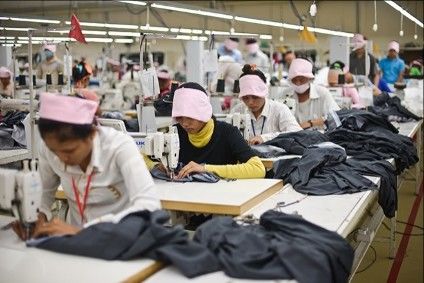
Labour rights groups are urging clothing brands and retailers to take steps to minimise the impact of the coronavirus on garment workers’ health and livelihoods.
The Covid-19 outbreak means many factories in garment-producing countries are shuttering because of a shortage of raw materials from China – with many more also likely to close as brands continue to reduce orders due to declining consumer demand and mandatory closure of shops.
“Garment workers already earn poverty pay, with wages barely covering their basic needs, let alone leaving anything extra to cover emergencies or periods without work. These factory closures, whether temporary or permanent, are hitting low-paid garment workers hard – especially migrant workers who might not have local social networks to rely on and could face additional restrictions or xenophobia,” explains the Clean Clothes Campaign (CCC) .
It adds media reports and direct information gathered through its network show that factories in a range of countries such as Sri Lanka, Bangladesh, Indonesia, Albania, and Central America are closing or at risk of closure because of shortages of raw material, reduced orders, and public health concerns.
Due to their low wages and “widespread repression of freedom of association rights”, garment workers already live in “precarious” situations and the economic fallout of the pandemic is having far-reaching consequences, the organisation says.
“The new coronavirus has reached global pandemic levels and is affecting people across the world, including garment workers in global supply chains. Protecting those most at risk means both taking steps to limit exposure and ensuring that people surviving on the poverty line are not pushed below it.

US Tariffs are shifting - will you react or anticipate?
Don’t let policy changes catch you off guard. Stay proactive with real-time data and expert analysis.
By GlobalData“Brands must take responsibility for workers throughout their supply chains and ensure that the garment workers who have made their profits possible do not carry the industry’s financial burden during this pandemic.”
Kalpona Akter, executive director of the Bangladesh Center for Worker Solidarity, adds: “Garment workers live hand to mouth. If workers lose their jobs, they will lose their monthly wages that put food on the table for them and their families. If workers are laid off, brands should ensure immediate payments to factories so that workers receive their full legally-owed severance.”
The situation has been especially dire for weeks already in Cambodia and Myanmar, with workers in the Southeast Asian countries among the hardest hit by fall out from the Covid-19 outbreak, according to unions.
Active steps brands can take to ensure workers continue to receive their wages during factory closures or sick leave include:
- Ensure that their supplier factories follow government requirements or recommendations regarding the suspension of large gatherings and close factories as necessary for the appropriate duration to protect the health of workers and their communities, while maintaining all workers’ contracts and payment of their full regular wages;
- Ensure that workers who are sent home because of a lack of work are compensated at their full regular wage;
- Ensure that workers who contract the virus, or suspect they have the virus, can take sick leave without negative repercussions and are compensated at their full regular wage during the period of recovery and self-isolation;
- Ensure that, when factories reopen, deadlines for orders are reassessed to prevent workers from working mandatory overtime to make up for delays;
- Ensure that measures to fight the virus do not unduly restrict workers’ freedom of movement or their freedom to organise.
Many major apparel supplier countries have reported interruptions to business as a result of the coronavirus outbreak. Factory owners in Bangladesh have said they have seen a marked rise in requests from buyers to delay payments as they battle with lower footfall and store closures.
Small and medium-sized enterprises (SMEs) in Myanmar’s garment sector similarly say they are feeling the impact of the coronavirus outbreak as a result of raw material shortages, but concern over a fall in orders is now spreading across the sector as the US teeters on the brink of recession.
Click here for additional insight on the coronavirus outbreak: Is coronavirus a threat to the clothing industry?




